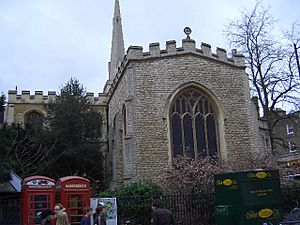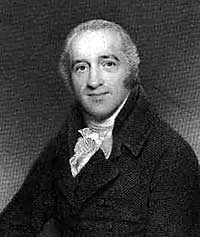Holy Trinity Church, Cambridge facts for kids
Quick facts for kids Holy Trinity |
|
|---|---|
| Holy Trinity Church | |

Holy Trinity Church from Sidney Street
|
|
| 52°12′21″N 0°07′13″E / 52.2059°N 0.1203°E | |
| Location | Market Street, Cambridge, Cambridgeshire, CB2 3NZ |
| Country | England |
| Denomination | Church of England |
| Churchmanship | Charismatic Evangelical |
| Website | www.htcambridge.org.uk |
| Architecture | |
| Style | Perpendicular Gothic |
| Years built | c.1400 |
| Administration | |
| Diocese | Diocese of Ely |
Holy Trinity Church is a historic church located on Market Street in Cambridge, England. It stands at the corner of Sidney Street. The current vicar, or lead pastor, is Stuart Browning. This church is known for its lively evangelical Christian tradition within the Church of England.
Contents
A Look at Holy Trinity's Past
Early Beginnings
The very first Holy Trinity Church in Cambridge was a small building made of timber with a thatched roof. It was built near an old Roman road. Sadly, this early church burned down in 1174.
A new stone church began to be built in 1189. Today, only the stonework of the west wall, under the tower, remains from that time.
Growing Through the Centuries
Around 1350, people raised money to make the church bigger. They widened the main area, called the nave, and added two side sections, known as aisles. A steeple was added to the church tower around 1348. Then, about 1400, two parts called transepts were built in a style known as Perpendicular.
During the period of the English Reformation (from 1550 to 1750), Holy Trinity Church continued to grow. In 1616, a special balcony, or gallery, was put up along the north side of the nave. This was to make space for the increasing number of people attending services.

The Time of Charles Simeon
From 1782 to 1836, Holy Trinity Church was a very important place for Christian life in Cambridge. This was mainly because of the work of Charles Simeon (1759–1836). He became the vicar even though some people in the church didn't like his strong evangelical beliefs at first.
In 1794, Simeon brought a barrel organ into the church, which could play sixty different hymn tunes. He didn't make many big changes to the building until 1834. At that time, the smaller chancel (the area near the altar) was taken down. It was replaced with a much larger new section made of brick and plaster. Simeon was also one of the people who helped start the Church Missionary Society in 1799. This group helps spread Christian teachings around the world.
Victorian Era Growth
The church continued to be known for its strong Christian message during Victorian times. In 1887, the chancel was finished with stone, and the old seats were replaced. New choir stalls were added, and most of the galleries were removed.
In the same year, the Henry Martyn Memorial Hall was built next to the church. This hall became a meeting place for Christian students at the University of Cambridge. Between 1873 and 1889, about 140 people from the church offered to join the Church Missionary Society. In 1885, a group known as the Cambridge Seven traveled to China, which inspired many other Christian missionaries.
Holy Trinity Today
Today, Holy Trinity Cambridge continues its tradition as a lively evangelical church within the Church of England. It follows the beliefs of the Church of England Evangelical Council.
Important People from Holy Trinity
Many notable people have been connected with Holy Trinity Church over the years:
- Peter Ackroyd, a scholar of the Bible, served here from 1957 to 1961.
- Charles Clayton was the vicar from 1851 to 1865.
- Thomas Rawson Birks served as vicar from 1866 to 1877.
- Max Warren was the vicar from 1936 to 1942.
- Thomas Goodwin was the vicar from 1632 to 1633.
Images for kids
-
The church entrance on Market Street, Cambridge
See also
- Church of St Mary the Great, another important church in Cambridge located near the university.
 | Toni Morrison |
 | Barack Obama |
 | Martin Luther King Jr. |
 | Ralph Bunche |




